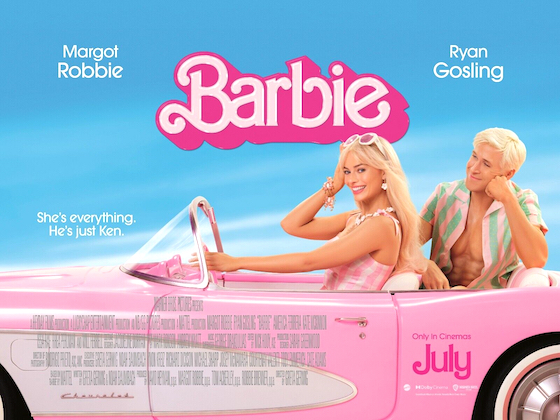
Once upon a time, a movie based on a children’s toy would’ve been IP slop; or, at best, surprisingly entertaining IP slop. Heck, there are dozens of direct-to-video animated Barbie movies that prove exactly that: they look cheap; they’re there to generate money from little girls (primarily) demanding to see the video of the toy they like; but some of them aren’t actually all that bad.
But that was a couple of decades ago. Now, the majority of our mainstream movie culture is based around originally-for-kids IP that people who have reached adult ages still apparently obsess over. And when it comes to “movies based on toys” specifically, we can look back to The LEGO Movie (released a whole decade ago this month) for a work that transcended what it “should have been” (an expensive 90-minute toy commercial) to become something genuinely entertaining; that used its IP in creative and fun and, yes, even meaningful ways. It’s those footsteps that the Barbie movie seeks to walk in.
And, thanks to some savvy behind-the-scenes choices, it succeeds! Heck, it almost succeeds too well. This is definitely a movie primarily aimed at adults, with enough silliness and bright colours on the side to not alienate kids too much. Though by “kids” I mean “teenagers”. Sure, the 12A and PG-13 ratings are permissive enough to take your six-your-old who actually plays with Barbies, but they’re going to be left floundering — or, worse, bored — as the film debates feminism, the patriarchy, and gender roles in general. This is a film about where Barbie, the toy, sits in our culture; what it represents, and what it should represent, and how successful or not it is at doing that. It’s not an essay film — those themes are smartly addressed along the way as part of a storyline about Barbie-the-toy crossing over into our real world, for various reasons — but nor is it a bright-and-colourful bit of fluff to entertain small kids. Maybe it could have been — that’s what Pixar used to excel at — but it’s not the route the filmmakers chose to go down.
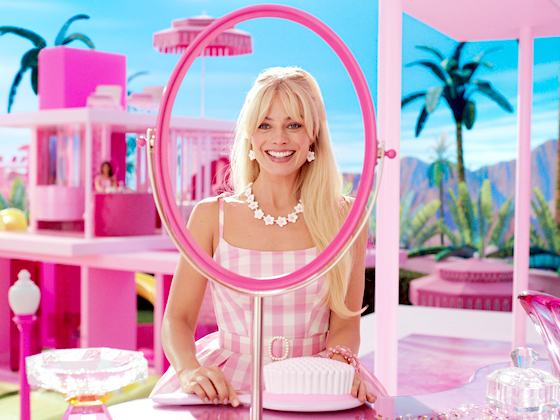
As for the meat of what the film has to say and how it says it… oy, I’m not sure I want to get into that discourse. It’s just asking to have annoying people jump up in your replies. Nonetheless, it’s quite bold for an IP title like this to criticise the patriarchy by inverting it and making a matriarchy the oppressive state; but without feeding into right-wing numpties by saying “see, women would be just as bad!”. People say the film is about feminism, which is true, but it’s specifically about what I’d consider the true meaning of feminism — which is really about genuine equality — rather than what reactionaries imagine it is, i.e. “women are best and should be in control”. It could also have hit that note in a shallow, almost accidental way; for example, if it had been a parade of “aren’t men stupid and annoying?” jokes. Put another way, the film cares as much about the Kens and their right to be individuals as it does the Barbies and their right to be powerful. (I said I didn’t want to write anything particularly ‘risky’ and look what I’ve gone and done…)
Also, thanks to my personal predilections, I particularly enjoyed how the film deconstructed itself; or, rather, the fact it was aware that it’s content based on product and engaged with that to some extent. It sits alongside other recent works like The Matrix Resurrections and Return to Monkey Island as works of art that have an awareness of where they sit in culture and why they exist, and are prepared to engage with that, to deconstruct it and analyse it, in quite an overt and meta fashion within the works themselves. Personally, that’s something I’ve wanted and dreamt of seeing, but never expected to get from studio IP — such self-awareness is kinda frowned upon when it’s saying “I exist for no artistic reason, purely to make more money for the studio”, as The Matrix 4 did most explicitly. What’s great about all three of these works is that they go beyond that obvious point, too.
In something of an about turn, others have criticised the film for not being subtle in the way it handles these issues. My friends, you’re watching a movie based on a toy, aimed at as wide an audience as possible. This isn’t an abstruse Palme d’Or contender — it’s a film that can hit your everyman round the face with a bright-pink hammer three times over and they still might miss the point. Sometimes, it’s the right choice to be, if not “on the nose”, then certainly overt. It’s ok for a story to have a point, and for that point to be clear.
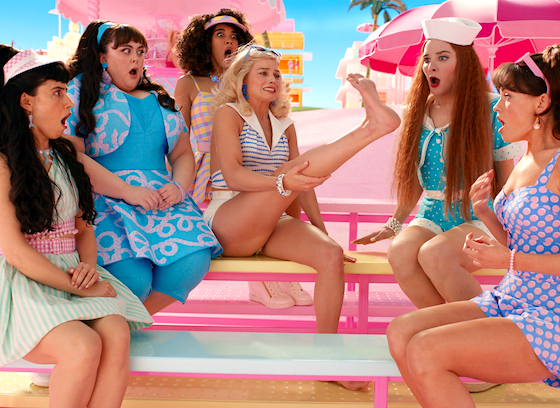
The other point of discourse the film has fired up came after the Oscar nominations, when co-writer/director Greta Gerwig and star/producer Margot Robbie were… nominated, actually, but not in the categories some people felt they should be nominated in. Although, if they’d swapped the nominations around, I expect they’d be annoyed the other way too. So, Gerwig gets a screenplay nod (which she might win, I guess?) but not a directing one (which she wouldn’t have, let’s face it), and Robbie is nominated for producing the film (a definite achievement — she’s spoken a lot in interviews about the efforts that went into making the film they wanted to make, and convincing the studio and toy manufacturers to go along with it) but not for acting (which she probably wouldn’t have won anyway). I don’t mean neither would have been deserving of the other nomination, but the directing gong seems almost sewn up for Christopher Nolan (for various reasons), and actress is a two-horse race between others. Besides, the real achievement is that the film exists as it is, with the content that it has — that’s a feat of writing and producing, not acting or, truly, directing (sure, in many other movies the director is king queen, but you get the distinct impression Barbie was significantly powered by Robbie; and when one person is both (co-)writer and director, surely a lot of their conceptual energy is injected at the writing stage).
Competitors aside, the quality of work can always be argued on its own merits. Gerwig’s direction is pacey and bright and fun, but is it as good as what she did in Lady Bird or Little Women? Which is to say, it fits the material well enough, but is it really special enough for an awards win? And also, who the fuck cares? Awards are kinda arbitrary. She did a good job. When it comes to Robbie’s performance, complaints have focused on the fact Ryan Gosling is nominated. Well, he’s in a different category — the fact he gave one of the five best supporting actor performances in 2023 has no bearing whatsoever on whether Robbie gave one of the five best, er, actressing performances of 2023. But yeah, Gosling does almost steal the film out from under Robbie, because he’s consistently hilarious with just enough introspection to add some character. That’s certainly the initial impression, I think. But Robbie is the film’s emotional core (yes, the movie about the plastic doll has emotions), which ultimately allows her to hang on to her own movie. That’s not something to underestimate: a lesser performer could have been overshadowed. Instead, they’re both excellent, particularly when they’re sharing a scene.
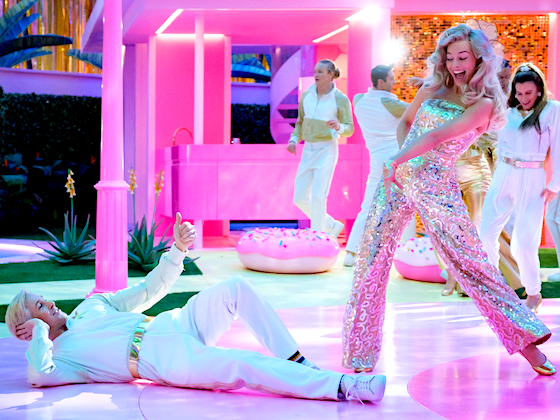
By rights, a Barbie movie should’ve been something inoffensively plasticky for little girls, possibly with some trite “you can do anything you want” message in between all the different outfits designed to sell more toys. Instead, Gerwig and Robbie have gone deeper and further in every respect — taking that “you can do anything”-type aphorism and dissecting it to find how true it is, or isn’t, and why. But they’ve wrapped that up in a movie that doesn’t forget to celebrate the thing it’s about, both by acknowledging Barbie’s good intentions and with piles of references to its history (what we’d call fan service if this was a a boys’ IP with tonnes of Lore or whatever). And, perhaps most importantly for a movie that, remember, is based on a toy — a thing that’s supposed to bring joy and fun and entertainment — they’ve made something full of fun and joy and entertainment.

Barbie is the 4th film in my 100 Films in a Year Challenge 2024.


 2017 Academy Awards
2017 Academy Awards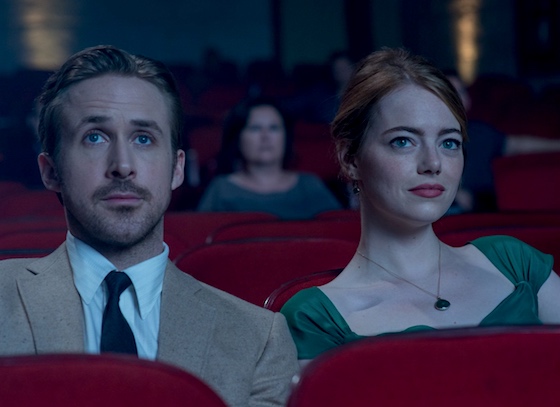









 You wouldn’t think the 2008 financial crisis would make good fodder for a comedy-drama — it’s both too complicated and too grim — but
You wouldn’t think the 2008 financial crisis would make good fodder for a comedy-drama — it’s both too complicated and too grim — but  The narrative is laden with concepts that are so complicated even people within the industry don’t properly understand all of them (however did the market fail?!), but the movie nonetheless attempts to explain them in an accessible way. It’s half successful: you kind of understand them at the time, about enough to follow along, but the chances of remembering them later are next to naught. One of McKay’s tricks to engage us with these explanations is to wheel in random celebrities to deliver analogies. It’s a fun idea, though it’s success is debatable — I mean, I’ve just about heard of Selena Gomez, and I guess the “famous chef” that turns up must have a TV show in America, or something, maybe? Yeah, the ‘names’ he’s chosen are going to date this movie far more than its 2008 setting ever will.
The narrative is laden with concepts that are so complicated even people within the industry don’t properly understand all of them (however did the market fail?!), but the movie nonetheless attempts to explain them in an accessible way. It’s half successful: you kind of understand them at the time, about enough to follow along, but the chances of remembering them later are next to naught. One of McKay’s tricks to engage us with these explanations is to wheel in random celebrities to deliver analogies. It’s a fun idea, though it’s success is debatable — I mean, I’ve just about heard of Selena Gomez, and I guess the “famous chef” that turns up must have a TV show in America, or something, maybe? Yeah, the ‘names’ he’s chosen are going to date this movie far more than its 2008 setting ever will. Though the conceptual explanations may fade almost as soon as you’ve heard them, what does stick with you is how it all ends. Essentially, the financial industry that destroyed peoples’ lives in pursuit of never-ending profit not only got away with it, but they actually started doing the same stuff all over again, just with new acronyms. What’s even more sickening is that people are clearly aware it’s going on — I mean, we’ve been told as much in an Oscar-winning movie — but they’re still doing nothing about it.
Though the conceptual explanations may fade almost as soon as you’ve heard them, what does stick with you is how it all ends. Essentially, the financial industry that destroyed peoples’ lives in pursuit of never-ending profit not only got away with it, but they actually started doing the same stuff all over again, just with new acronyms. What’s even more sickening is that people are clearly aware it’s going on — I mean, we’ve been told as much in an Oscar-winning movie — but they’re still doing nothing about it.
 The directorial debut of uber-hearththrob movie star Ryan Gosling is not what you might expect someone of that particular adulation to produce. It’s not just that it has a dark heart, but that it’s slow, opaque, perverted, and not easily summarisable.
The directorial debut of uber-hearththrob movie star Ryan Gosling is not what you might expect someone of that particular adulation to produce. It’s not just that it has a dark heart, but that it’s slow, opaque, perverted, and not easily summarisable. It comes to a very cathartic ending, on multiple levels. I almost didn’t realise I needed that catharsis at the end — I knew I wanted certain characters to get their comeuppance, but the load that seems to lift at the end, with all the different climaxes combined, including parts that might not seem ‘good’… well, it’s almost like Rat is right about Bones’ actions lifting a bad spell.
It comes to a very cathartic ending, on multiple levels. I almost didn’t realise I needed that catharsis at the end — I knew I wanted certain characters to get their comeuppance, but the load that seems to lift at the end, with all the different climaxes combined, including parts that might not seem ‘good’… well, it’s almost like Rat is right about Bones’ actions lifting a bad spell.